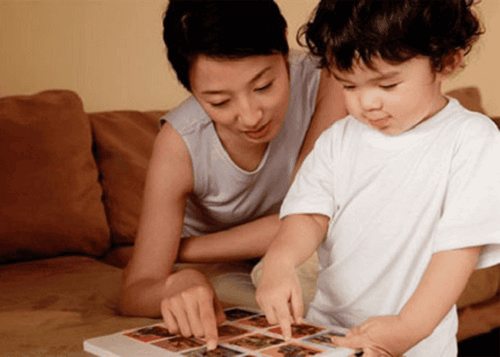This is an automatically translated article.
Children's natural language ability is formed right from birth. In the first months of life, babies show this ability through crying, babbling. The older they are, the more they are exposed to and imitated from the surrounding world, the more proficient the child's speaking ability will be. However, each child has a unique development rate, some children speak fast and some children speak slowly, some children talk a lot and some children talk less. Parents can consider teaching their baby to talk early if they feel it is necessary.
1. The right time to teach children to speak
Usually babies learn to talk in the first 2 years after birth.
From birth to 18 months: Children will rely on the way adults communicate with each other to learn the rules of language. Children will begin to use their tongue, lips, roof of their mouth and even their baby teeth to make sounds, starting with crying, then babbling, babbling sounds imitated from those around them. From 18 months to 2 years: Children will begin to convert single, discrete words into 2- or 4-word sentences, then they will practice using words to describe what they hear, see, feel, thoughts and desires. From 2 to 6 years old: This is the time when children learn to pronounce like adults. At this stage, if the child stutters, hesitates, parents do not need to worry too much about the child's speech delay, just listen and observe whether the child is similar to his or her peers. If the answer is the same, then rest assured that the child will say it correctly until the age of 6-7.

Giai đoạn 2-6 tuổi là thời điểm trẻ học cách phát âm giống như người lớn
2. What should parents do if the child is slow to speak?
Parents are the first people to help children form language development. If your child has any symptoms that make you worried, for example, when he is old, but he still refuses to talk, you can seek the advice of doctors and specialists, perform a hearing test. speaking, assessing language ability, considering some methods of teaching children to speak early.
3. Methods of teaching children to speak
3.1. Talk to your child often
Parents, take advantage of talking to your baby when you're around him and describe to him what you're doing, combine instructions, ask and teach him to sing. Parents can use simple, easy-to-listen and short sentences to make it easier for children to learn to say words from you. On the other hand, you also need to play the role of listening, looking at your baby and responding to what he is saying. Talking regularly will help build connections in your baby's brain. Research also shows that children who hear babbling sounds from their parents are more likely to babble by the age of 1.

Thường xuyên trò chuyện cùng con
3.2. Ask questions to your baby
Around 6 weeks of age, your baby will be more interested in everything around. Therefore, parents should learn to ask simple questions for children such as: "Are you hungry?", "Do you want to eat?". At the same time, show your baby something like: "Look, a flower", "There's grandma". .. When the child is a little older, add a few more details such as: “Look, is the car red?”, “Isn't that house small?”...
3.3. Copy baby sounds
From 3 - 4 months old, the initial "oh", "a" sounds will gradually turn into babbles, this is also the time when your baby starts to practice speaking with sounds like "bababa" ”, “dadada”... Parents can copy, imitate the sounds that the baby emits, with the aim of encouraging the baby to speak more.

Trẻ tập nói từ đơn giản khi học nói
3.4. Express their feelings
When children are practicing babbling, babbling, they will add different melodies to their own voice. By around 6 months your baby will be sensitive to anger or joy in your voice and will imitate making more emotional sounds to get attention. Parents, please recognize children's emotions through sounds and respond to help them feel happier, more interested in their own voice.
3.5. Make use of melodies and songs
A great way to teach your baby to speak early is through nursery rhymes and songs. Children often love to hear their parents' voices. Listening to melodies will help your baby understand how to start and end a sound, thereby helping your baby in learning how to pronounce slurs later.

Tận dụng giai điệu nhạc thiếu nhi khi dạy trẻ tập nói
3.6. Combination of talking and gesturing
Before the age of 1, many babies will only react to things they like or are interested in. Therefore, attracting the baby's attention with gestures such as waving, pointing can be useful in the process of teaching your baby to speak early. From these gestures, your baby can learn to shake his head when he doesn't want to, and nod when he wants to. Some parents even teach their children some simple sign language to encourage them to communicate before they can speak.
3.7. Build your baby's vocabulary
By the age of 1, your baby is usually able to master a few words. This is also the time to push your baby to practice saying his first words. If your child says something wrong or mispronounces it, correct it. In addition, parents can also help children build more vocabulary by giving them a variety of choices and encouraging them to use more words.

Trẻ chơi trò ghép từ giúp gia tăng vốn từ vựng
3.8. Using books to teach children to speak
Young children often love the vivid, bright, and vibrant pictures in books. Parents can buy books and teach children how to read or look at pictures in them. Reading stories is an effective way for children to be exposed to more vocabulary, understand how to combine simple sentences into a story. When your baby is interested in the tone of your story, likes the content of the story and likes the pictures, he will be excited to tell you what he already knows.
3.8. Be patient when talking to your baby
By the age of 2, children will begin to put words together to form simple sentences. Teaching children to talk early often takes a lot of time, so be patient and slowly give your baby time to talk. For example, if you ask a question, be patient while waiting for your child's answer.
Teaching children to speak is an important milestone in a child's language development. Parents should encourage children to practice speaking and use more words, thereby patiently helping children perfect their language ability.

Cha mẹ trò chuyện với bé để giúp bé nhanh biết nói
To register for examination and treatment at Vinmec International General Hospital, you can contact Vinmec Health System nationwide, or register online HERE
MORE:
Typical signs Report children with speech delay The golden time to intervene for children with speech delay What child is considered a speech delay?













